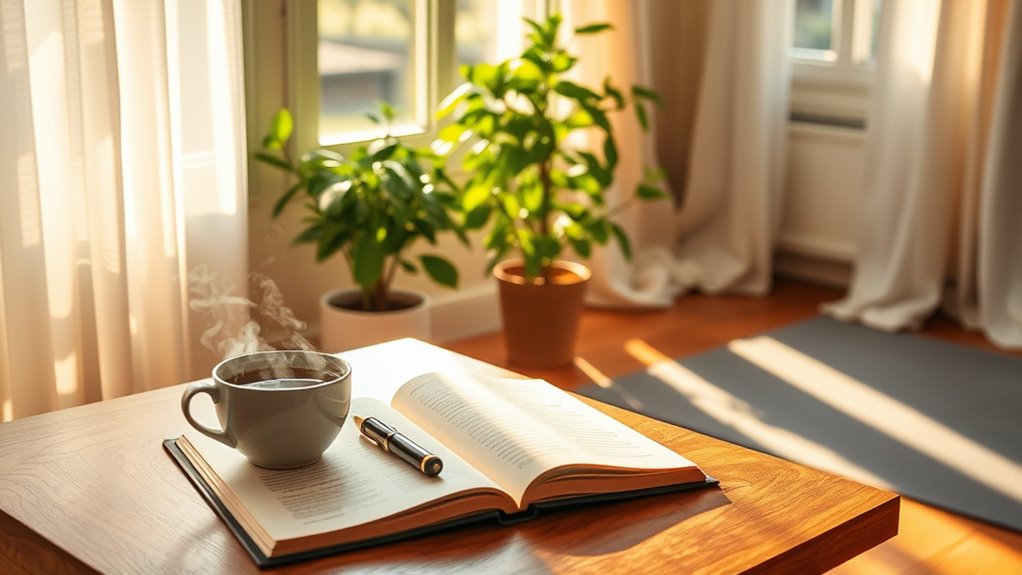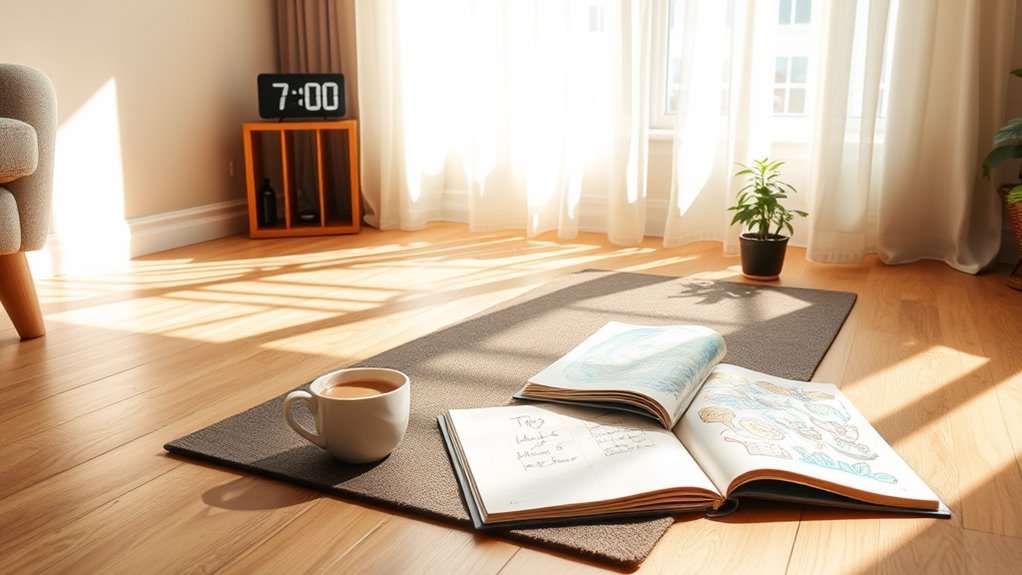My Nightly Routine for Better Sleep – Here’s What Works for Me!
To improve your sleep, start by setting a consistent schedule—go to bed and wake up at the same time daily. Create a calming environment, free of clutter, with soft lighting and comfortable bedding. Limit screen time an hour before bed and engage in mindfulness or meditation practices. Light stretching or a warm bath can relax your body, while immersing yourself in a good book helps shift your focus. Discover more steps to enhance your nighttime routine!
Key Takeaways
- I stick to a consistent sleep schedule, going to bed and waking up at the same time every day, even on weekends.
- My bedroom is a relaxing environment with soft lighting, comfortable bedding, and calming colors, promoting a tranquil atmosphere.
- I turn off all screens at least an hour before bed, opting for reading or listening to calming music instead.
- I enjoy a light snack or herbal tea before bed, avoiding caffeine and heavy meals to ensure a restful night.
- I incorporate gentle stretching or a warm bath into my routine, helping to release tension and signal my body to relax.
Setting a Consistent Sleep Schedule
When you set a consistent sleep schedule, you help your body regulate its internal clock, making it easier to fall asleep and wake up feeling refreshed.
Aim to go to bed and wake up at the same time every day, even on weekends. This consistency reinforces your body’s natural rhythm and promotes better sleep quality.
Start by determining your ideal sleep duration—typically, seven to nine hours for most adults. Gradually adjust your bedtime if necessary, shifting it in 15-minute increments.
Additionally, limit your exposure to screens and stimulating activities an hour before sleep. Establishing a nighttime routine can further enhance the quality of your sleep.
Creating a Relaxing Environment
To create a relaxing environment for better sleep, focus on transforming your bedroom into a calming sanctuary.
Start by decluttering the space; a tidy room promotes tranquility. Optimize your lighting with soft, warm bulbs or dimmers to create a serene atmosphere. Incorporate soothing colors like soft blues or earthy tones to enhance relaxation.
Invest in comfortable bedding and pillows that invite you to unwind. Consider adding calming scents through essential oils or candles, which can greatly impact your mood. Establishing a soothing bedtime routine can further enhance your sleep quality.
Finally, regulate the temperature to a cool, comfortable level, as this supports restful sleep. By mindfully curating your bedroom environment, you’ll set the stage for restorative slumber and wake up feeling rejuvenated.
Limiting Screen Time Before Bed
As you wind down for the night, limiting screen time becomes essential for improving your sleep quality. Research shows that blue light emitted from devices can disrupt your circadian rhythm, making it harder to fall asleep. Additionally, prioritizing sleep is crucial for maintaining overall quality of life, as it significantly impacts both physical health and mental well-being.
To optimize your pre-sleep routine, consider these strategies:
- Set a digital curfew—turn off screens at least an hour before bedtime.
- Replace screen time with reading a book or listening to calming music.
- Use blue light filters if you must use devices.
- Create a tech-free zone in your bedroom to encourage relaxation.
- Engage in non-digital activities, like journaling or gentle stretching.
Practicing Mindfulness and Meditation
Practicing mindfulness and meditation can transform your nightly routine and enhance your sleep quality.
By incorporating simple techniques, you can create a calm environment that helps your mind unwind.
Let’s explore some effective methods to cultivate mindfulness and make meditation a part of your evening ritual. Additionally, focusing on the power of breath during meditation can significantly improve your relaxation response and promote deeper sleep.
Benefits of Mindfulness
How can mindfulness and meditation transform your nightly routine? By integrating these practices, you’re paving the way for deeper relaxation and restorative sleep.
Here are some powerful benefits you’ll experience:
- Reduces stress and anxiety, allowing your mind to unwind.
- Enhances focus, promoting clarity as you prepare for the next day.
- Improves emotional regulation, helping you respond better to challenges.
- Boosts overall well-being, fostering a sense of peace and contentment.
- Promotes self-awareness, deepening your connection to your thoughts and feelings.
Incorporating breathing techniques into your mindfulness practice can further enhance the relaxation response, making it easier to let go of the day’s worries.
As you incorporate mindfulness into your evening ritual, you’ll find it easier to let go of the day’s worries.
Embrace this transformative journey, and watch how your nightly routine elevates your sleep quality and overall health.
Meditation Techniques to Try
Meditation can be a game-changer for your nightly routine, offering a variety of techniques to enhance mindfulness and relaxation.
Start with focused breathing: inhale deeply through your nose, hold for a few seconds, and exhale slowly through your mouth. This simple practice calms your mind and prepares you for sleep.
You might also try body scan meditation, where you mentally check in with each part of your body, releasing tension as you go.
If you’re drawn to visualization, imagine a serene setting—like a tranquil beach or a quiet forest.
Ultimately, explore guided meditations through apps or online resources to deepen your practice.
Whichever method you choose, consistency is key to mastering these techniques for better sleep.
Creating a Calm Environment
Creating a calm environment is essential for fostering relaxation and enhancing your sleep quality. By incorporating mindfulness and meditation into your nightly routine, you can prepare your mind and space for restorative rest.
Here are some key elements to take into account:
-
Dim the lights: Lowering brightness signals your body it’s time to wind down.
-
Minimize noise: Use earplugs or white noise machines to create a peaceful soundscape.
-
Control the temperature: Keep your bedroom cool for ideal sleep conditions.
-
Eliminate clutter: A tidy space promotes mental clarity and relaxation.
-
Incorporate soothing scents: Use essential oils like lavender to enhance tranquility.
Engaging in Light Stretching or Yoga
As you wind down for the night, engaging in light stretching or yoga can greatly enhance your relaxation and prepare your body for sleep.
Incorporating gentle movements, like forward bends or child’s pose, helps release tension accumulated throughout the day.
Focus on your breath as you stretch; inhaling deeply fosters calmness, while exhaling releases stress.
Aim for a routine that lasts about 10 to 15 minutes, allowing yourself to shift smoothly into restful sleep.
Pay attention to how your body feels, and modify poses to suit your comfort level.
This mindful practice not only eases muscle tightness but also signals your brain that it’s time to unwind, making it an essential part of your nightly ritual for better sleep.
Avoiding Heavy Meals and Caffeine
To improve your sleep quality, pay attention to what and when you eat.
Heavy meals close to bedtime can disrupt your rest, while caffeine in the evening can keep you awake longer than you’d like.
Consider timing your meals and exploring caffeine alternatives to create a more restful nighttime routine.
Timing of Meals
While enjoying a late dinner can be tempting, heavy meals close to bedtime can disrupt your sleep cycle. To optimize your nightly routine, consider the timing and content of your meals.
Aim to finish dinner at least two to three hours before you hit the sack. This gives your body time to digest, promoting better rest.
- Choose lighter fare for dinner, like salads or grilled proteins.
- Incorporate complex carbohydrates for sustained energy.
- Avoid rich sauces and heavy desserts.
- Plan small, healthy snacks if you’re hungry before bed.
- Stay hydrated, but limit fluid intake right before sleep.
Caffeine Alternatives
Heavy meals aren’t the only culprits that can sabotage your sleep; caffeine consumption can also keep you tossing and turning throughout the night.
To enhance your nightly routine, consider swapping out your usual caffeinated beverages for calming alternatives. Herbal teas, like chamomile or valerian root, offer soothing properties that promote relaxation. If you crave something warm, try warm milk or a caffeine-free chai blend to wind down.
Even dark chocolate can be a guilt-free indulgence in moderation, as it contains less caffeine than coffee. By being mindful of these caffeine alternatives, you can create a peaceful environment that encourages restful sleep.
Embrace these changes, and you’ll likely find yourself drifting off more easily, feeling refreshed for the day ahead.
Incorporating Herbal Teas Into My Routine
Incorporating herbal teas into your nightly routine can transform your sleep experience, as these soothing beverages offer a range of calming properties.
By choosing the right herbal tea, you can signal to your body that it’s time to unwind. Here are some options to contemplate:
-
Chamomile: Known for its calming effects, it helps reduce anxiety.
-
Lavender: Offers a fragrant aroma that promotes relaxation.
-
Valerian Root: Often used for its sedative qualities to aid sleep.
-
Peppermint: Invigorating yet soothing, it can ease tension.
-
Lemon Balm: A member of the mint family, it soothes restlessness.
Brew a cup about an hour before bed, and embrace the tranquility that follows.
Taking a Warm Bath or Shower
There’s something incredibly soothing about taking a warm bath or shower before bed. This simple ritual can help signal your body that it’s time to wind down. As you immerse yourself in the warmth, your muscles relax, tension fades, and your mind starts to clear.
Aim for a temperature that’s comfortably warm but not too hot, ideally between 90-100°F.
Consider adding Epsom salts or essential oils to enhance the experience. The magnesium in Epsom salts can further relax your body, while calming scents like lavender promote tranquility.
Spend at least 15-20 minutes in the bath or shower, allowing the warmth to envelop you. By incorporating this nightly practice, you’ll create a peaceful shift into sleep, paving the way for a restful night.
Reading a Book to Unwind
Reading a book before bed can be a delightful way to unwind and prepare for sleep. It allows your mind to shift away from daily stresses and immerse itself in a different world.
To make the most of this calming activity, consider these tips:
- Choose a genre that relaxes you, whether it’s fiction, poetry, or non-fiction.
- Set a specific reading time to create a consistent routine.
- Use soft, ambient lighting to reduce eye strain.
- Keep your reading material nearby for easy access.
- Limit your reading time to avoid overstimulation before sleep.
Using Aromatherapy for Relaxation
When you want to enhance your relaxation before bedtime, using aromatherapy can be a simple yet effective solution.
Start by selecting essential oils known for their calming properties, like lavender or chamomile. Diffuse these oils in your bedroom to create a soothing atmosphere, or add a few drops to your pillow for a more personal touch.
Experiment with different scents to find what resonates with you, as each person’s preference varies. You might also consider incorporating a warm bath with aromatic oils to elevate your experience.
Keeping a Sleep Journal for Reflection
Keeping a sleep journal can be a powerful tool for enhancing your nighttime routine. By documenting your thoughts and experiences, you gain insights into your sleep patterns and triggers.
Here’s how to make the most of your sleep journal:
- Record your bedtime and wake-up time.
- Note any evening rituals or habits you practiced.
- Reflect on your thoughts and emotions before sleep.
- Track factors like food, caffeine, or exercise that might impact your rest.
- Evaluate your sleep quality and any dreams you remember.
Reviewing your entries regularly helps identify patterns and areas for improvement. This practice not only fosters self-awareness but empowers you to make informed adjustments, ultimately leading to better sleep and a more rejuvenating nightly routine.
Frequently Asked Questions
How Long Does It Take to See Improvements in Sleep Quality?
You’ll typically notice improvements in sleep quality within a few weeks of implementing consistent habits. Stick with your routine, and you’ll likely experience deeper, more restorative sleep as your body adjusts to the changes.
Can Naps During the Day Affect Nighttime Sleep?
Naps can definitely affect your nighttime sleep. If you nap too long or too late in the day, it might hinder your ability to fall asleep at night. Timing and duration matter for ideal rest.
What if I Wake up in the Middle of the Night?
Waking up in the middle of the night can feel like a thief in the night, stealing your rest. When it happens, stay calm, breathe deeply, and avoid screens to help drift back to sleep.
Are There Specific Herbs That Work Best for Sleep?
Yes, certain herbs can enhance your sleep quality. Valerian root, chamomile, and lavender are popular choices. Try incorporating them into your evening routine to promote relaxation and help you drift off more easily.
How Do I Know if My Sleep Environment Is Ideal?
To determine if your sleep environment is ideal, assess factors like darkness, temperature, noise levels, and comfort. Experiment with adjustments, and notice how these changes affect your sleep quality and overall restfulness.





